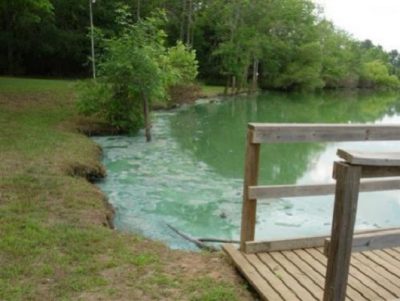This story has been updated.
Officials with the N.C. Department of Environmental Quality’s Division of Water Resources are urging the public to avoid an algal bloom on the east side of the Chowan River because of a toxin called microcystin, a type of cyanobacteria.
Supporter Spotlight

Test results announced Thursday by the North Carolina Department of Health and Human Services indicate the bloom is producing microcystin at observed levels greater than 250 micrograms per liter.
“At these levels, officials with the Division of Public Health would consider this bloom a high risk for acute health effects during recreational exposure, based on guidance values published by the World Health Organization,” the department announced.
State environmental officials have been monitoring numerous blooms in the Chowan River since May, DEQ said Tuesday. On July 17, staff from the Estuarine Monitoring Team responded to a reported algal bloom near Arrowhead Beach in Edenton.
Environmental conditions controlling toxin production by cyanobacteria are not well understood and can change rapidly over time and location, officials said. North Carolina has had no reports of adverse health effects in people associated with this algal bloom. State health officials routinely encourage the public to avoid contact with large accumulations of algae and prevent children and pets from swimming or ingesting water in an algal bloom.
State water quality and health officials suggest the following steps to safeguard children and pets from any algal bloom:
Supporter Spotlight
- Keep children and pets away from water that appears bright green, blue, discolored or scummy. Do not handle or touch large mats of algae.
- Avoid handling, cooking or eating dead fish that may be present.
- If you come into contact with an algal bloom, wash thoroughly.
- Use clean water to rinse off pets that may have come into contact with an algal bloom.
- If your child appears ill after being in waters containing an algal bloom, seek medical care immediately.
- If your pet appears to stumble, stagger or collapse after being in a pond, lake or river, seek veterinary care immediately.
For more information on potential health effects from algal blooms, visit the N.C. Division of Public Health’s website. To learn more about algal blooms in North Carolina, visit the Division of Water Resources’ website.







